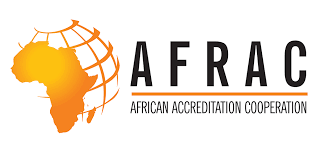African Accreditation Cooperation (AFRAC)

The African Accreditation Cooperation (AFRAC) is a regional body established to enhance and facilitate cooperation among accreditation bodies, National Accreditation Focal Points (NAFPs), and stakeholders involved in conformity assessment across the African continent. Formed in 2010, AFRAC's mandate is to provide African member states with an accreditation infrastructure to support the national, regional, and international recognition and acceptance of conformity assessment results. This promotes trade and protects public health, safety, and the environment in both voluntary and regulatory contexts.
AFRAC plays a critical role in ensuring that products and services traded within Africa and exported to global markets meet required standards of quality and safety. It manages Mutual Recognition Arrangements (MRAs) among its members, ensuring that test results, inspections, and certifications accredited by one member are accepted by all others. This mutual acceptance facilitates trade across borders, reduces costs, and enhances the economic competitiveness of African products internationally. AFRAC achieved recognition under the International Laboratory Accreditation Cooperation (ILAC) MRA and the International Accreditation Forum (IAF) Multi-Lateral Arrangement (MLA) on May 22, 2018. This recognition bolsters the global acceptance of conformity assessment results accredited by African bodies.
AFRAC is part of the Pan-African Quality Infrastructure (PAQI), recognized by the African Union (AU) as the continental platform for standardization, metrology, accreditation, and conformity assessment. This inclusion underscores AFRAC’s pivotal role in harmonizing accreditation practices and strengthening quality infrastructure across Africa.
AFRAC's initiatives also focus on building capacity within the continent through training programs, technical assistance, and knowledge sharing among its members. These efforts aim to raise the standard of accreditation services, promote uniform application of international standards, and develop the capabilities of National Accreditation Focal Points (NAFPs) in countries without national accreditation bodies. Stakeholders include regional economic cooperation structures, regulators, industry associations, and government representatives.
Membership in AFRAC is structured into Full Members, Associate Members, Stakeholder Members, and Arrangement Members. Full Members are accreditation bodies legally recognized by AU Member States, operating according to international accreditation standards. NAFPs serve as contact points in economies without accreditation bodies. Stakeholder Members include national authorities and associations interested in accreditation matters, while Arrangement Members are signatories to AFRAC’s MRA, ensuring compliance with its rigorous evaluation procedures.
AFRAC’s overarching mission is to support trade and industrial development, improve the competitiveness of African products, and enhance public health and environmental protection. Its vision is to be recognized by the African Union and its Member States as the leading accreditation cooperation body serving Africa’s economy and society.
For more information about AFRAC's initiatives, governance, membership, and impact, please visit their official site.

